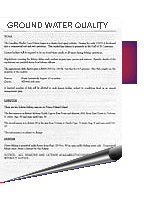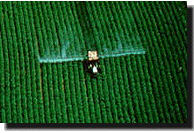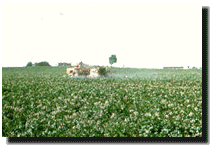

With the Island surrounded by the waters
of the Gulf of St. Lawrence and blessed with many
freshwater streams, it is easy for Prince Edward
Islanders to take clean water for granted. Indeed,
Islanders are among the largest water users in Canada.
Water is so abundant that we have not felt the need to
conserve it. Nevertheless, we do know the importance of
protecting it from contamination. Water is vital to human
health, agriculture, woodlands, wildlife and diverse
types of ecosystems such as wetlands, bogs, salt marshes,
coastal sand dunes, beaches, and offshore islands. In
addition, our industries such as agriculture, fishing,
aquaculture, tourism, and food processing depend on the
availability of clean water.
About one third of the 1,100 millimetres of precipitation
that annually falls on Prince Edward Island soaks into
the earth to become groundwater. Approximately one
quarter more joins Island watercourses as surface water.
The rest returns to the air through evaporation and
transpiration. Stream water eventually makes its way to
the ocean, meeting the tide as it travels up the
Island’s waterways. The areas where the fresh and
salt water mix are called estuaries.
Island groundwater is generally of excellent quality.
Water entering the water table seeps slowly through the
soil so that many undesirable substances are usually
filtered out. But there are many risks posed to
groundwater quality. The quality of Island drinking water
can be undermined by toxic contaminants including
petroleum products, pesticides, nitrates, and manure.
Leaks and spills from petroleum storage tanks and
collapsed pipes for fuel tanks used in home heating
account for many small spills. Even a small leak,
however, can have enormous repercussions as one litre of
leaked oil can contaminate one million litres of drinking
water. In 1977, for example, 31 Kensington household
wells were contaminated by a leaking underground storage
tank that had become corroded. Since that incident, the
government has required property owners to remove over
two thousand steel storage tanks from the ground.
Since agriculture is such an important industry and, by
its nature, inextricably part of water cycles, farm
related activities can have substantial impacts on water
quality. Pesticides can seriously contaminate ground
water; especially when large quantities are released or
spilled. Under normal use conditions,
however, pesticides are very rarely detected in ground
water quality tests. On  a rare but
notable occasion some years ago, a potato insecticide had
leached into a community’s ground water. The
substance was subsequently removed from the list of
approved pesticides and is no longer in use on the
Island. However, many factors, such as soil type, tillage
and planting systems, irrigation methods, and rainfall
patterns influence pesticide leaching. And, more
importantly, pesticide use in the province is on the
rise.
a rare but
notable occasion some years ago, a potato insecticide had
leached into a community’s ground water. The
substance was subsequently removed from the list of
approved pesticides and is no longer in use on the
Island. However, many factors, such as soil type, tillage
and planting systems, irrigation methods, and rainfall
patterns influence pesticide leaching. And, more
importantly, pesticide use in the province is on the
rise.
Similarly, fertilizers both natural and chemical, contain
nitrates. Nitrogen in this form can be a common
contaminant in Island groundwater due to its abundant use
in farming. As the size and intensity of livestock
operations increase, so do the risks of water
contamination by manure.
Erosion | Soil Conservation | Surface Water Quality |
Forestry Practices | Natural Disasters | Irving Whale